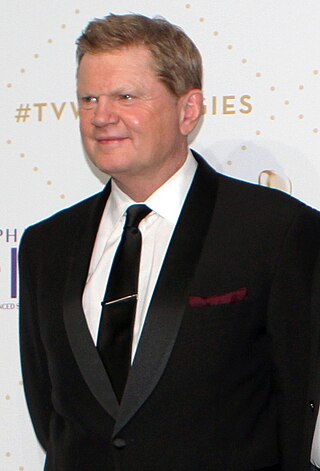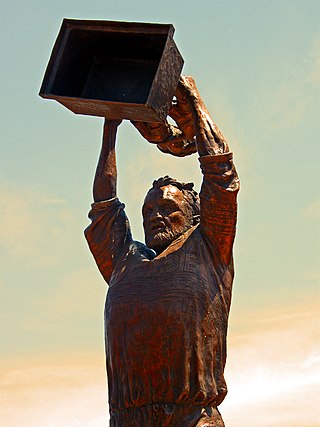
Walter James Lewis AM is an Australian former professional rugby league footballer who played in the 1970s, 1980s and 1990s, and coached in the 1980s and 1990s. He became a commentator for television coverage of the sport. A highly decorated Australian national captain, Lewis is widely regarded as one of the greatest ever players of rugby league. His time as a player and coach was followed by a career as a sports presenter for the Nine Network.

Paul Vautin, nicknamed Fatty, is an Australian football commentator and former professional rugby league footballer, captain and coach. He has provided commentary for the Nine Network's coverage of rugby league since joining the network in 1992 and also hosted The Footy Show from its beginnings in 1994 opposite co-host Peter Sterling, until 2017. An Australian Kangaroos test and Queensland State of Origin representative lock or second-row forward, Vautin played club football in Brisbane with Wests, before moving to Sydney in 1979 to play with Manly-Warringah, whom he would captain to the 1987 NSWRL premiership. He also played for Sydney's Eastern Suburbs, and in England for St Helens.
John Ribot, also known by the nickname of "Reebs", is an Australian sports administrator, former rugby league footballer of the 1970s and 1980s. Once a Queensland State of Origin and Australian international representative, Ribot was the 1980 NSWRFL season's equal top try-scorer. Also a member of the 1982 "Invincibles" Kangaroo touring squad, he played club football in Brisbane for Fortitude Valley, Wests and Redcliffe, and in Sydney for Newtown, Wests and Manly-Warringah.
Eric Grothe Sr., also known by the nickname "Guru", is an Australian former professional rugby league footballer who played in the 1970s and 1980s. A New South Wales and Australian representative wing, he played club football for the Parramatta Eels with whom he won four NSWRL premierships. Since retiring, Grothe has been named amongst the nation's finest footballers of the 20th century
Christopher Anderson is an Australian former professional rugby league footballer who played in the 1970s and 1980s, and coached in the 1990s and 2000s. An Australian Kangaroos and New South Wales Blues representative winger, he featured in Canterbury-Bankstown's third grand final win and captained Halifax to both League and Cup success.

Raymond Alan Price is an Australian former dual-code international rugby union and rugby league footballer. He was nicknamed “Mr Perpetual Motion” for his hard, intimidating style of play in league at lock forward. Price played rugby league for Sydney's Parramatta Eels club, with whom he won four NSWRL premierships, a Dally M Medal and a Rothmans Medal. He also played in State of Origin for New South Wales.
Mark Murray is an Australian former rugby league footballer and coach. He represented Australia in test matches and Queensland in the State of Origin. His position of choice was halfback. Murray has also coached in the National Rugby League and State of Origin.
Dale Shearer, also known by the nickname of "Rowdy", is an Australian former professional rugby league footballer who played in the 1980s and 1990s. A Queensland State of Origin and Australian international representative of Aboriginal heritage, he played club football in Queensland, New South Wales and England. His playing career included a NSWRL Premiership win with Manly-Warringah in 1987 and a Rugby League World Cup Final win in 1988. Ten years after his retirement, Shearer was still the all-time top try-scorer in State of Origin and he was named on the wing of the Indigenous Australian team of the century.
Robert Fulton, also nicknamed "Bozo", was an Australian international rugby league footballer, coach and later commentator. Fulton played, coached, selected for and has commentated on the game with great success at the highest levels and has been named amongst Australia's greatest rugby league players of the 20th century. As a player Fulton won three premierships with the Manly-Warringah Sea Eagles in the 1970s, the last as captain. He represented the Australian national side on thirty-five occasions, seven times as captain. He had a long coaching career at the first grade level, taking Manly to premiership victory in 1987 and 1996. He coached the Australian national team in thirty-nine Tests. He was a New South Wales State selector and a national selector. He was a radio commentator with 2GB at the time of his death in 2021, aged 73. In 1981, he was selected as one of the initial four post-war "Immortals" of the Australian game and, in 2008, he was named in Australia's team of the century.
Graham "Wombat" Eadie, is an Australian former rugby league footballer who played in the 1970s and 1980s. He has been named amongst Australia's finest of the 20th century. A New South Wales State of Origin and Australian international representative fullback, he played in Australia during Manly-Warringah's dominance of the NSWRFL competition during the 1970s. He won four premierships with them and his 1,917 points in first grade and 2,070 points in all grades were both records at the time of his retirement. Eadie also played in England for Halifax, winning the Challenge Cup Final of 1987 with them. He also won World Cups with Australia and collected awards such as the Rothmans Medal and Lance Todd Trophy.
Stephen John Ella is an Australian former rugby league footballer who played in the 1970s and 1980s. He was a utility back for the Parramatta Eels, New South Wales and Australia, playing in 4 Tests for Australia between 1983 and 1985. He is a cousin of the Ella brothers who were prominent in Australian rugby union in the 1980s.
Dennis Ward was an Australian professional rugby league footballer. He was a halfback who played first grade in the NSWRFL Premiership for Canterbury-Bankstown and Manly-Warringah from 1965 to 1972, winning the 1972 Grand Final with Manly. He also played for City Firsts, New South Wales and Australia in representative football.
Michael William Cronin OAM is an Australian former professional rugby league footballer and coach. He was a goal-kicking centre for the Australian national team and a stalwart for the Parramatta Eels club. He played in 22 Tests and 11 World Cup matches between 1973 and 1982. Cronin retired as the NSWRL Premiership's and the Australian Kangaroos' all-time highest point-scorer and has since been named amongst the nation's finest footballers of the 20th century.
Max Krilich is an Australian former rugby league footballer who played in the 1970s and 1980s. He was a hooker for the Australia national team, playing in thirteen Tests from 1978 to 1983 and as captain on ten consecutive occasions in 1982 and 1983. He was the captain of the 1982 “Invincibles” Australian touring side. Krilich received the Medal of the Order of Australia (OAM) in the 2018 Queen's Birthday Honours for service to rugby league.

Cliff Lyons is an indigenous Australian former international rugby league footballer who played in the 1980s and 1990s. A Clive Churchill Medallist and two-time Dally M Medallist, he made 309 first-grade appearances with the Manly Warringah Sea Eagles, winning grand finals with them in 1987 and 1996. Lyons also represented New South Wales and Australia, being part of the successful 1990 Kangaroo Tour of Great Britain and France.
Kerry Boustead is an Australian former rugby league footballer who played in the late 1970’s, 1980’s, & early 1990’s. A talented representative wing for Queensland and Australia, at the time he was picked for the national team he was the youngest ever player so selected. A prolific try-scorer, he has been named amongst the nation's finest footballers of the 20th century.
Alan Thompson is an Australian former professional rugby league footballer and coach. He played for the Manly-Warringah Sea Eagles in the New South Wales Rugby League (NSWRL) competition from 1973 to 1984 and coached the club in 1989. He primarily played at Five-eighth.
Steve Martin is an Australian former professional rugby league footballer who played in the 1970s and 1980s, and coached in the 1990s. He was a representative player at both state and international levels and played in the New South Wales Rugby League (NSWRL) competition for Manly-Warringah Sea Eagles, and the Balmain Tigers. Martin primarily played in the halfback position.
Ken Day (1936–1998), also known by the nickname of "High Tower", was an Australian professional rugby league footballer who played in the 1960s. An Australian international and Queensland representative forward, he played his club football in Brisbane for Western Suburbs and in Sydney for Manly-Warringah.
The 1973 Kangaroo Tour was the thirteenth Kangaroo Tour, and saw the Australian national rugby league team travel to Europe and play nineteen matches against British and French club and representative rugby league teams, in addition to three Test matches against Great Britain and two Tests against the French. It followed the tour of 1967-68 and the next was staged in 1978.



